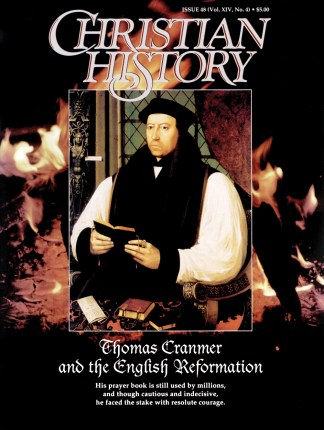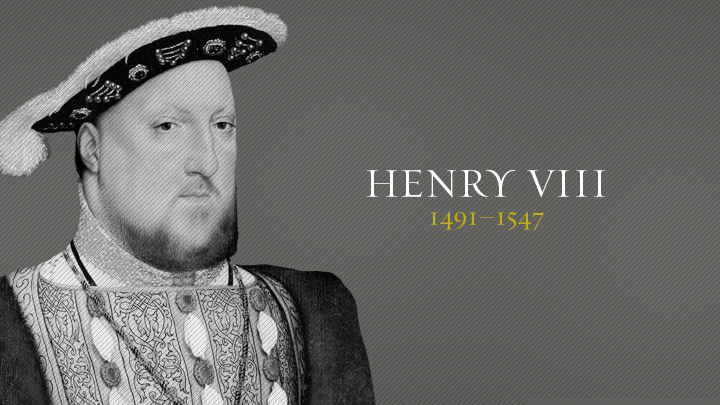"I do not choose anyone to have it in his power to command me, nor will I ever suffer it."
Many consider Henry to have been a dilettante king, letting his ministers run the country while he hunted stag. In truth he was actively involved in the details of anything that he judged important. Henry demanded the facts be boiled down to their essence. Then he would listen to the issues and make a quick decision, often in the time it took him to dismount from his horse.
The most important decision of his reign, however, he struggled with for years. But once he determined his course, he followed it with a flurry of decisions that forever changed his country.
Timeline |
|
|
1456 |
Gutenberg produces first printed Bible |
|
1479 |
Establishment of Spanish Inquisition |
|
1488 |
First complete Hebrew Old Testament |
|
1491 |
Henry VIII born |
|
1547 |
Henry VIII dies |
|
1549 |
Book of Common Prayer released |
An auspicious beginning
Henry was born the second son of Henry VII. He was intelligent, handsome, physically powerful, talented in music, and an avid hunter and sportsman. He was sole ruler of England and the richest man in the world at 18 years of age.
To cement England's alliance with Spain, Henry wed the Spanish king's aunt, Catherine of Aragon (also the widow of his brother). When Henry defeated France and Scotland in successive battles, his popularity soared. Over the next decade, Henry made and broke peace treaties, stood for election as Holy Roman Emperor, engaged in the power politics of Europe, and turned his attention to religion.
Henry had always been a religious man. He heard mass five times a day unless he was hunting (then he could only hear three). He was also deeply interested in theological disputes. In 1521, with Lutheranism infecting the English universities, Henry wrote Defense of the Seven Sacraments against Luther. A beleaguered and grateful pope rewarded him with the title "Defender of the Faith."
Producing an heir
By 1526 Henry began to seek ways to end his marriage with Catherine. The alliance with Spain was restricting his international intrigues, he had fallen in love with 19-year-old Anne Boleyn, and, most importantly, Catherine had failed to give him a male heir (she did give birth to a daughter, Mary). England had recently survived a bloody and costly civil war; Henry needed a male heir to insure a peaceful succession upon his death.
Getting an annulment was fairly easy in the sixteenth century—if both parties wanted one. But Catherine was unwilling and sought the support of her nephew, Emperor Charles V. The emperor didn't want to see his aunt disgraced and routed the pope's troops. Pope Clement, seeing the score, had no choice but to refuse Henry the annulment.
When Anne became pregnant in 1532, Henry moved ahead on his own. He had already forced the clergy to submit to his supremacy in all ecclesiastical matters. Now he married Anne in secret, had his new archbishop of Canterbury, Thomas Cranmer, declare his marriage to Catherine invalid, and crowned Anne queen in 1533. Henry and the church teetered on the brink of schism.
A fight for control
When the pope threatened excommunication, Henry plunged ahead. He passed one act forcing all to recognize the children of his new marriage as heirs to the throne. Then he passed another making him the "supreme head" of the church in England. He dissolved monasteries, redistributing their property to his nobles to reinforce their loyalty. Monks who resisted were executed, and the money from their treasuries went into his coffers.
Still, in an era of Reformation, his church reforms were conservative. He appeared to want a Catholic church—just one that was always loyal to him and to England. "I do not choose anyone to have it in his power to command me, nor will I ever suffer it," he once said. So while he broke from Rome, he continued to uphold transubstantiation and demanded clerical celibacy.
Meanwhile, Henry tired of Anne because she had only produced a girl—Elizabeth. He trumped up charges of infidelity against her, had her beheaded, and then married Jane Seymour. After she gave birth to a son (Edward), she died. Henry married three more times before he died.
Henry's break from Rome was fundamentally over control of the English church. Though he instituted some Protestant measures during his reign (like putting English Bibles in all the churches), and though he always supported his Protestant-leaning archbishop of Canterbury, Cranmer, Henry sided with Rome on key issues of doctrine and practice.
But the events he set in motion would not permit England to return to the past. During the reign of his son, Edward VI (1547–53), England turned staunchly Protestant. After a brief return to Catholicism under Mary I (1553–1558), his daughter Elizabeth I set England on a permanently Protestant course.
Corresponding Issue











